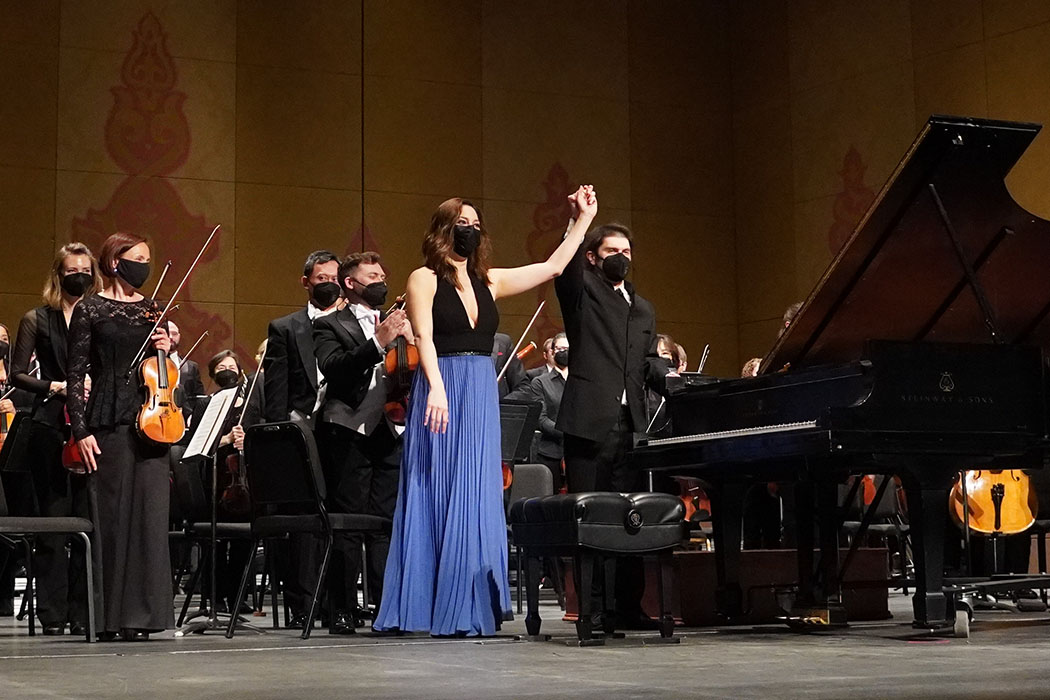Orchestra programming and guest artist booking by symphony orchestras are done a year or more in advance, so it hardly seems fair to dwell on unfortunate coincidences that somehow manage to sneak their way onto an organization’s performance calendar. Nevertheless, it was a bit uncanny that just over four years ago, in February 2018, we were remarking on the unfortunate coincidence of the otherwise excellent Knoxville Symphony Orchestra’s Russian-themed program of works by Tchaikovsky, Rachmaninoff, and Rimsky-Korsakov at the very time of public outrage and displeasure with Russian incursions in Syria. Jump ahead those four years to the KSO’s Masterworks concerts last weekend and we found ourselves honoring the latest victim of Putin’s Russia, the country and people of Ukraine, with a specially-added concert opener, Melody in A minor, by the late Ukrainian composer, Myroslav Skoryk. Although feelings of anxiety and urgency were inescapable, this concert of works by Dame Ethel Smyth, Piotr Tchaikovsky, and Johannes Brahms turned out to be an evening of a determined orchestra performing brilliantly.
Sharing the bond of unfortunate coincidences was pianist Tanya Gabrielian who was the guest artist on that concert in 2018 performing Rachmaninoff’s Rhapsody on a Theme of Paganini— and who returned last week to perform Tchaikovsky’s iconic Piano Concerto No. 1 with Maestro Aram Demirjian on the podium. Coincidences, though, were the only unfortunate things about Ms. Gabrielian’s performance—a performance that was at once bold, powerful, and satisfyingly assertive, defying those who might believe that this very, very familiar work does not deserve a fresh sense of adventure. Gabrielian went even further, giving her performance a physical and musical sensuousness that illuminated the work’s poetic romance. However, this focus was not ostentatious, schmaltzy, or demanding, wild or particularly percussive, but rather, unabashedly enticing in its lyrical directness.

Of course, the middle Andantino makes its sense of romance quite clear. The gentle opening melody from the flute (KSO Principal Flute Devan Jaquez) was absorbed and repeated by the piano, then restated beautifully by the oboe (KSO Principal Oboe Claire Chenette). Although flirting with delicacy, Gabrielian’s piano never fell into submissiveness, always maintaining its equal presence, even when orchestral volumes rose in passion. And, speaking of passion, the finale was nothing less than orgasmic with the energy and acceleration bringing the audience to its feet in appreciation for the experience.
After the opening Skoryk Melody, Demirjian launched into the concert’s original opening work, the Overture to The Boatswain’s Mate by English composer, Dame Ethel Smyth. The connection of Smyth to Tchaikovsky and Brahms had been one focus of Demirjian’s program, notably the fact that all three knew each other in their lifetimes. [See the Arts Knoxville preview] Hopefully, contemporary listeners can overcome the gender bias that worked against Smyth during her lifetime and judge her intriguingly attractive music objectively. Inevitably, listeners find themselves charmed by Smyth’s overture, which contains passages from The March of the Women that became the anthem of the British suffragette movement.
It had been far too long—February of 2009—since the KSO last performed Brahms Symphony No. 2 in D Major. On this occasion, this oh-so satisfying work making up the second half of the evening was treated to a superb performance by Demirjian and the orchestra with a rich sense of texture and an ever-moving palette of dynamics. The tight ensemble of KSO strings (Concertmaster William Shaub) was joined in the lush ebb and flow of a sunlit musical river journey by beautifully rendered woodwind and horn assertions (oboe Claire Chenette, flute Devan Jaquez, clarinet Gary Sperl, and horn Jeffery Whaley). The finale that surges a bit unexpectedly confirms, at last, that just perhaps, everything will be alright. We can only hope that is so.








